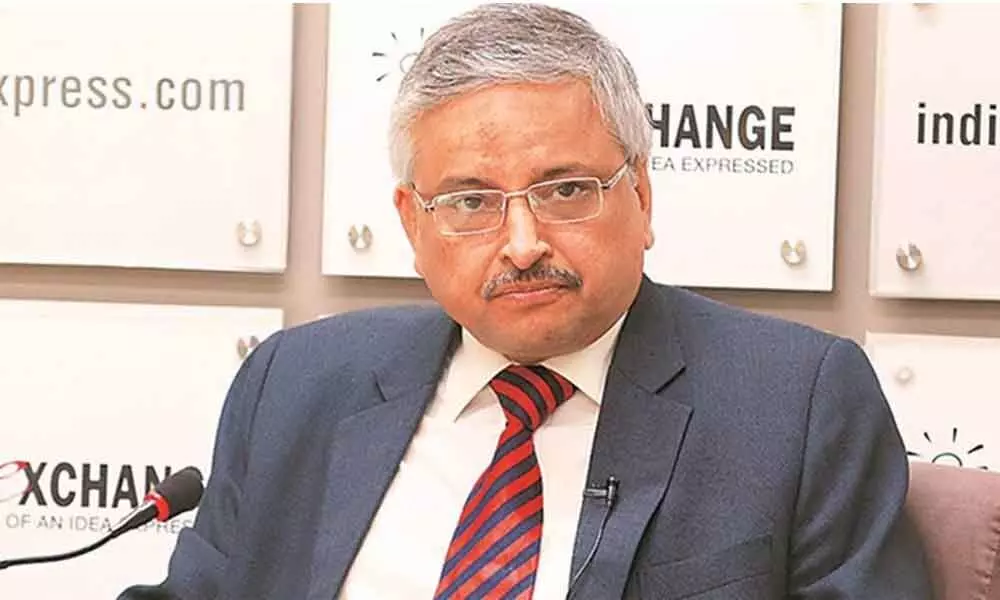Live
- Donate Blood, Save Lives: BJP Hosts Mega Blood Donation Camp in Aiza
- Azerbaijani Airliner Crashes Near Aktau, Kazakhstan: 32 Survive, Over 30 Feared Dead
- Union Minister Bandi Sanjay Kumar to Visit Jogulamba Gadwal District on December 27, 2024
- Gadwal Lawyers' United Protest: Opposition to District Court Relocation Gains Momentum
- Christmas Celebrations in Jogulamba Gadwal: A Festival of Unity, Charity, and Joy
- Lawyers Seek MP DK Aruna’s Intervention to Prevent District Court Relocation
- Israel, Hamas trade blame for delays in reaching Gaza ceasefire deal
- PM Modi, President Murmu extend Hanukkah greetings to Israeli counterparts
- Mohammad Abbas returns as Pakistan announce playing XI for Boxing Day Test vs South Africa
- Man Sets Himself on Fire Near Rail Bhawan in New Delhi, Investigation Ongoing
Just In

AIIMS chief Guleria
Could hit India in 6 to 8 weeks: AIIMS chief Guleria
New Delhi: Covid third wave in India is "inevitable" and it could hit the country in the next six to eight weeks, AIIMS chief Dr Randeep Guleria said amid unlocking in parts of the country after weeks of strict restrictions.
The country's main challenge is vaccinating a huge population and the increase in dose gaps for Covishield "may not be a bad" approach to provide protection to cover more people, he explained.
A new frontier will have to be developed in India's fight against Covid to further study the mutation of the virus, Dr Guleria stressed, as he talked about the new Delta-plus variant, which has evolved from the Delta variant of Covid-19, triggering fresh concerns about monoclonal antibody treatment. "As we have started unlocking, there is again a lack of Covid-appropriate behaviour. We don't seem to have learnt from what happened between the first and the second wave. Again, crowds are building up... people are gathering. It will take some time for the number of cases to start rising at the national level.
Third wave is inevitable, and it could hit the country within the next six to eight weeks... may be a little longer," Dr Guleria said. "It all depends on how we go ahead in terms of Covid-appropriate behaviour and preventing crowds," he added.
Nearly 5 per cent of the country's population has so far been vaccinated with two doses. The government aims to vaccinate 108 crores of over 130 crore people in the country by the end of this year.
"That (vaccination) is the main challenge. A new wave can usually take up to three months, but it can also take much lesser time, depending on various factors. Apart from Covid-appropriate behaviour, we need to ensure strict surveillance.
Last time, we saw a new variant - which came from outside and developed here - and led to the huge surge in the number of cases. We know the virus will continue to mutate. Aggressive surveillance in hotspots is required," the AIIMS chief said.
"Mini-lockdown in any part of the country, which witnesses a surge and a rise in positivity rate beyond 5 per cent, will be required. Unless we're vaccinated, we're vulnerable in the coming months," he underlined, stressing that "testing, tracking, and treating" should be the focus in hotspots. "We have to factor in human behaviour while unlocking, which needs to be done in a graded manner," Dr Guleria stressed.
On the spread of the Delta variant in the United Kingdom, which is now facing a third wave, he said, "Virus is still mutating, we need to be careful". The highly transmissible variant first identified in India is now making up 99 per cent of fresh Covid-19 cases in the UK. The gap between the new waves is shortening and it's "worrying", Dr Guleria said.
"During the first wave (in India), the virus was not spreading that rapidly... all that changed during the second wave, and the virus became much more infectious. Now the Delta variant that's spreading is much more infectious. Faster spread is likely," said the AIIMS chief.
A debilitating second wave had led to the shortage of hospital beds and medical supplies in various parts of India. SOS messages on social media had caught the world's attention with many nations coming forward to help. Several states have now eased the restrictions after weeks of strict curbs; however, preparations are on against the third wave.
In Maharashtra, experts have now warned that at its peak, the third wave of the virus could cause 8 lakh active cases in the state, which currently has around 1.4 lakh patients. "When there is a huge increase in the number of cases, shortage of (hospital) beds follows. The strategy should be multi-pronged - we have to make sure fresh cases don't rise. Any healthcare system globally will tend to collapse with the unprecedented rise in the infections," Dr Guleria said.

© 2024 Hyderabad Media House Limited/The Hans India. All rights reserved. Powered by hocalwire.com







